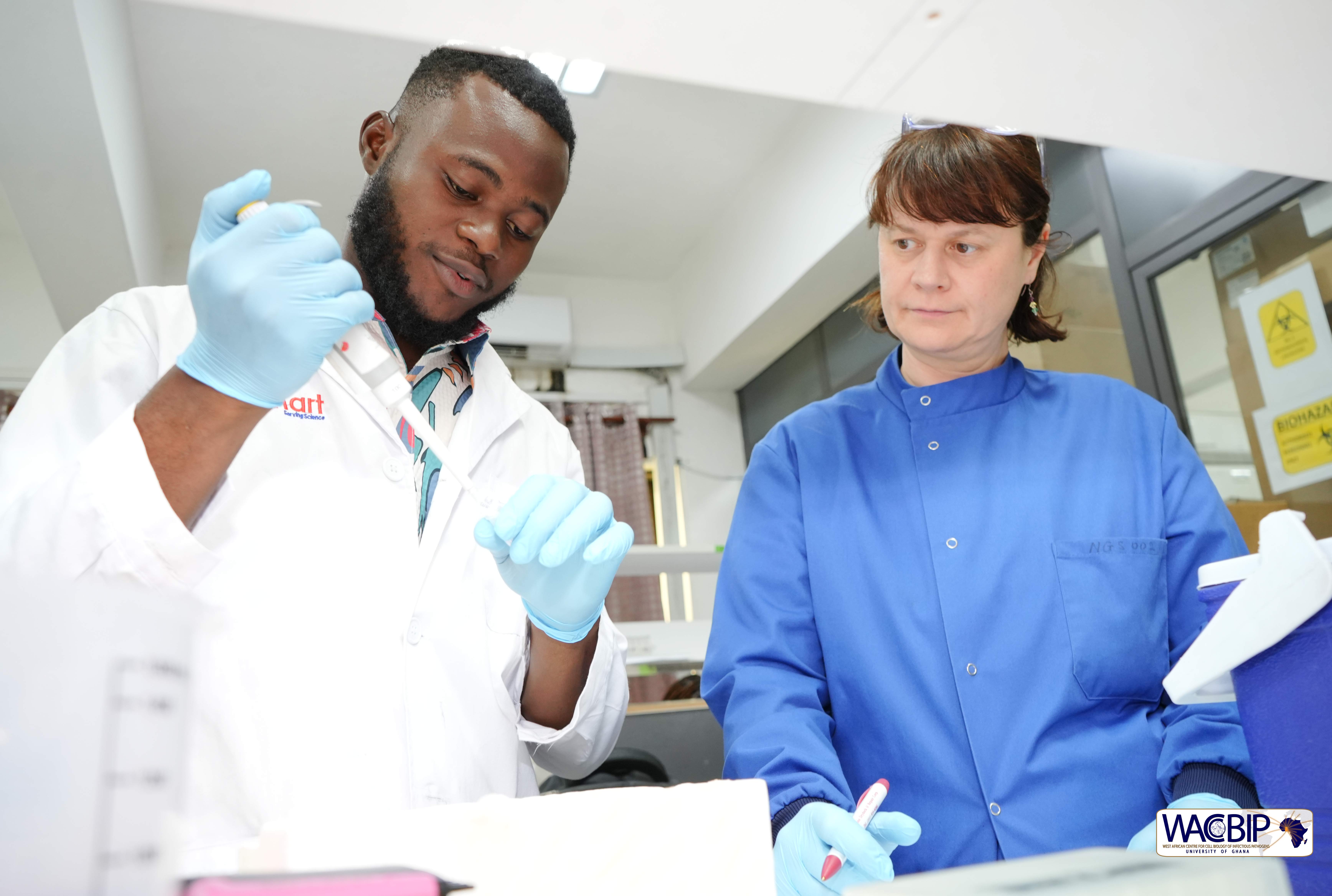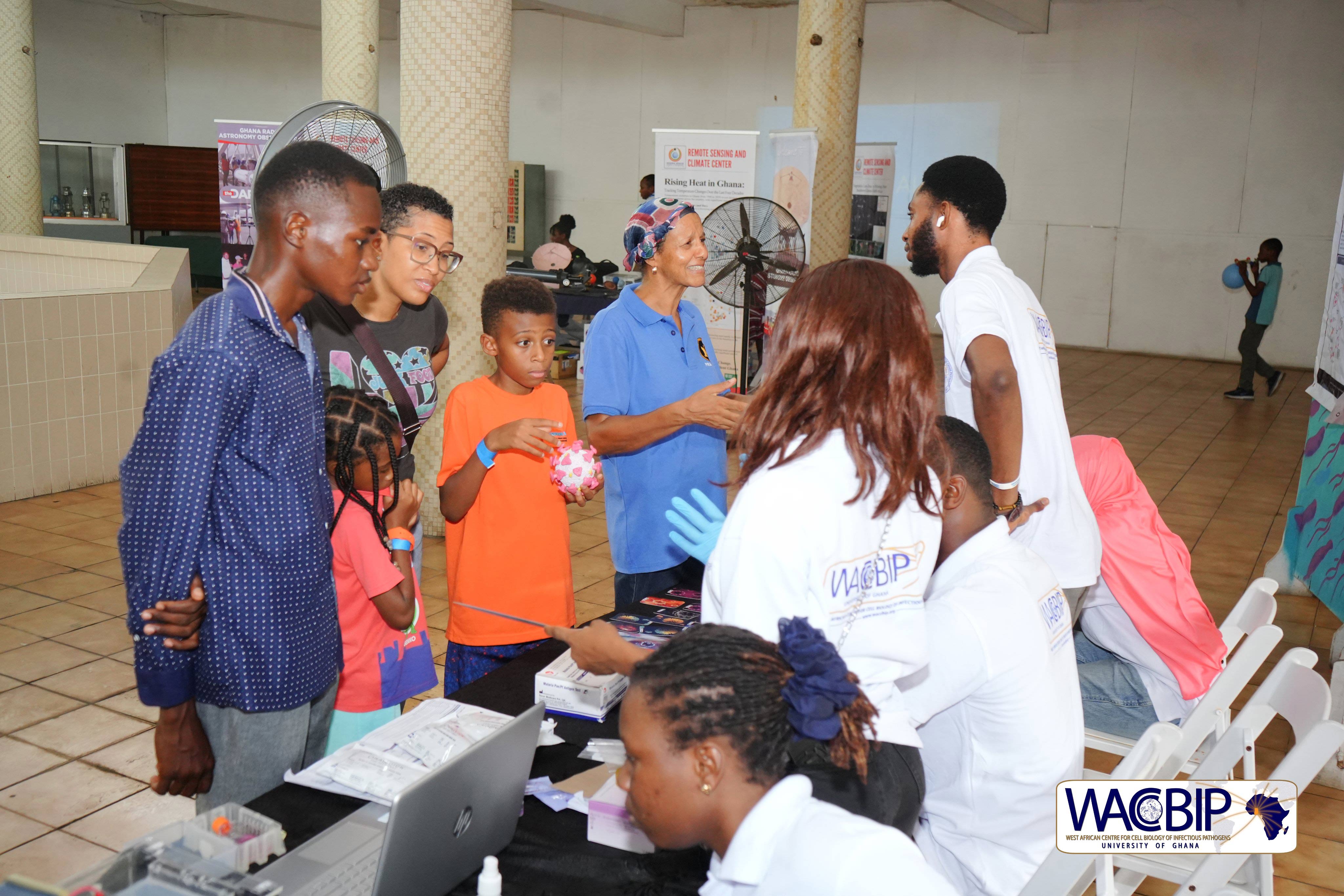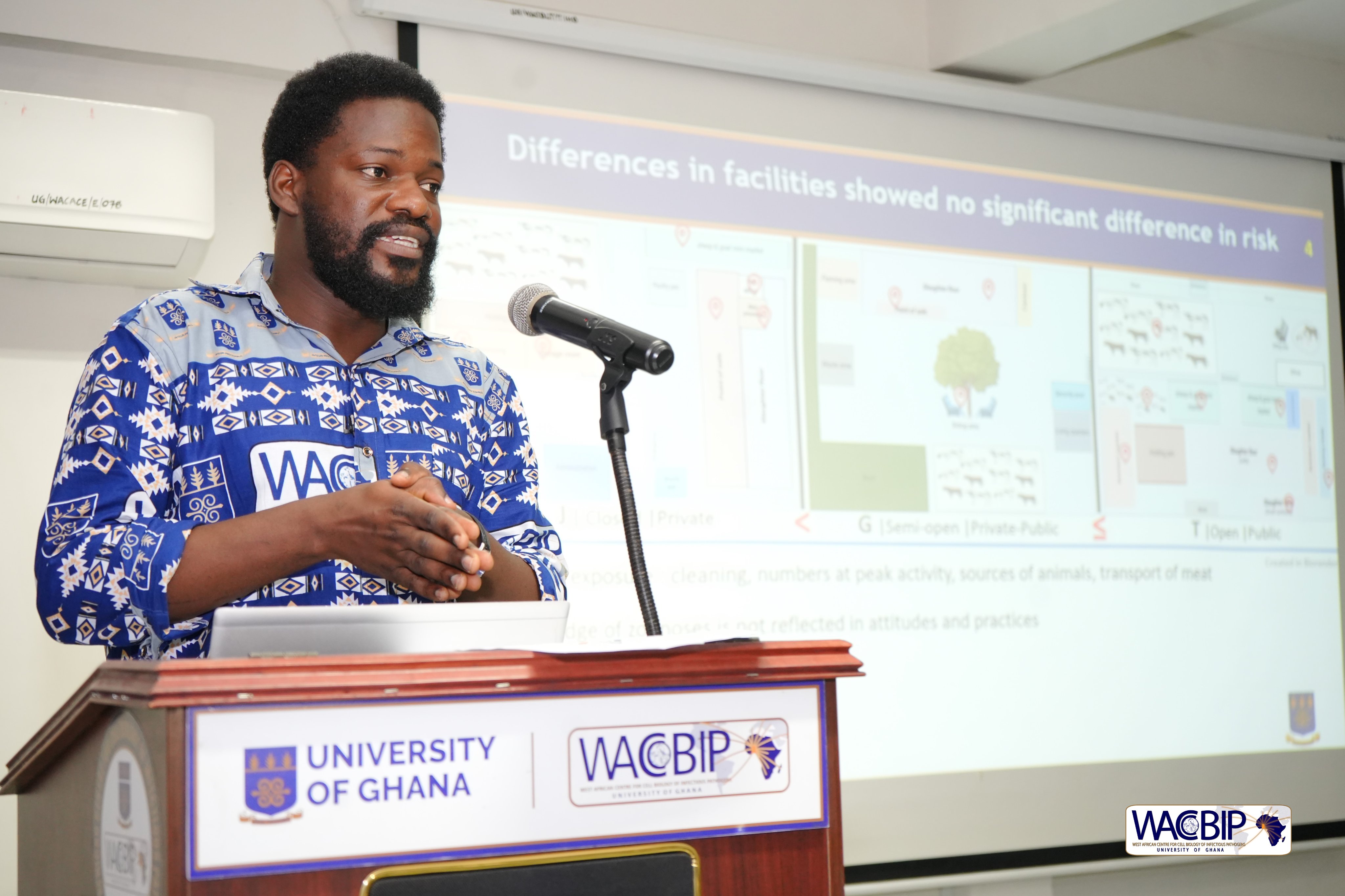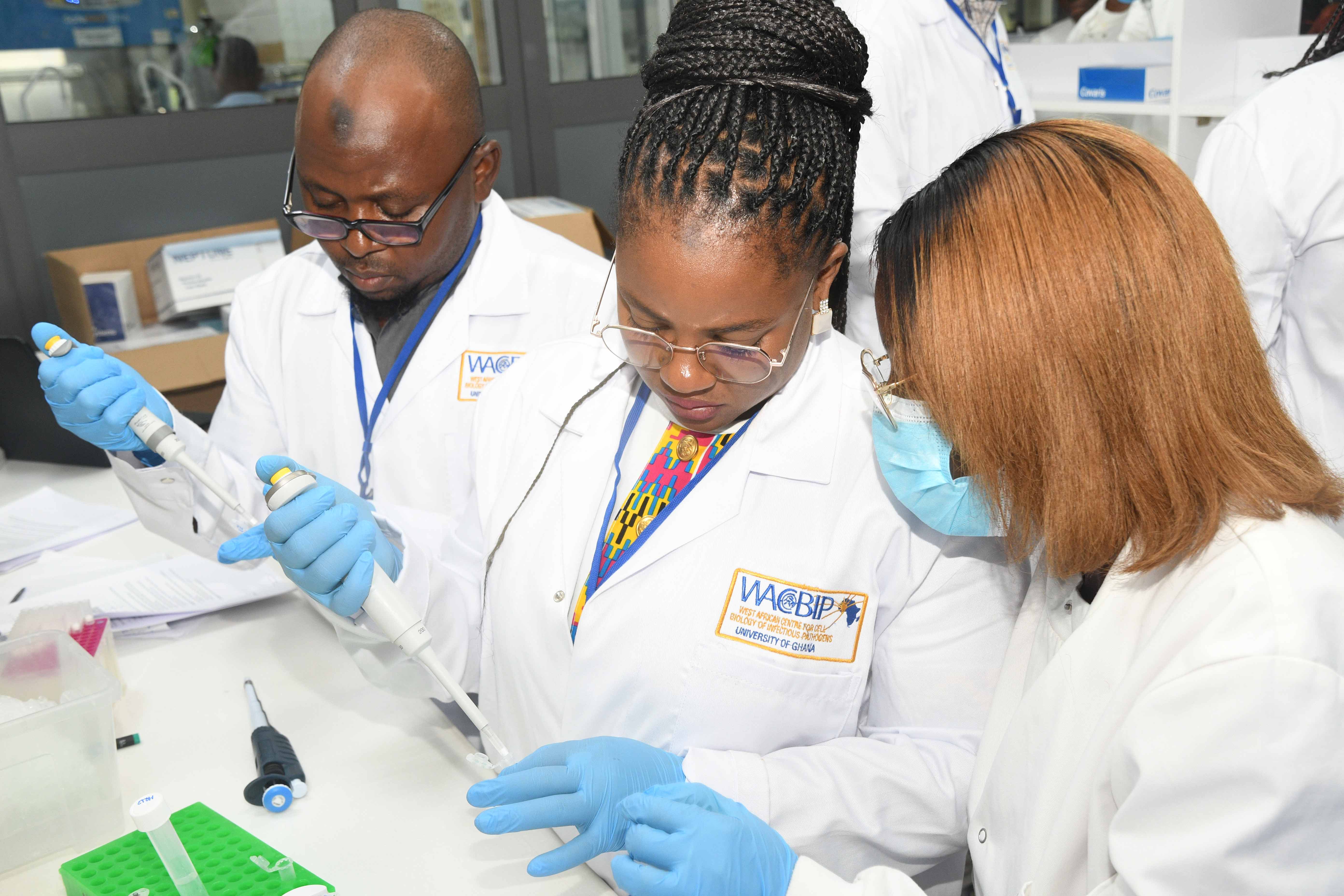The West African Centre for Cell Biology of Infectious Pathogens (WACCBIP), from January 13 to January 24, hosted scientists from the American Society for Cell Biology (ASCB), the Oxford Brookes University and the University of Oxford for the fifth annual WACCBIP-ASCB-Oxford workshop at the University of Ghana.

The two-week workshop was designed to equip 15 first-year PhD students and 26 first-year MPhil students with advanced knowledge in cell biology of common pathogens, and to develop key professional skills towards building successful careers in Science.
Speaking at the opening ceremony, Director of WACCBIP, Professor Gordon Awandare, welcomed collaborators and acknowledged their commitment to the training and mentorship of young scientists in Africa. He thanked them for their continued willingness to freely avail their time and expertise towards the workshop since 2016 and encouraged the participants to take full advantage of the opportunities for learning that the workshop offers them.
“It is our great pleasure once again to offer this course for the next two weeks,” Prof. Awandare said. “What the purpose of this workshop is, is to do two things: first is to level you up and bring you up to speed in terms of molecular biology, biochemistry, and your background knowledge about basic science. Number two is to introduce you to modern research methods and this would go from hard bench methods to bioinformatics.”
[caption id="attachment_6021" align="aligncenter" width="1024"]
Director of WACCBIP, Professor Gordon Awandare address participants at the opening ceremony[/caption]
“At the end of the two weeks, I assure you that you will be better scientists, that you will feel more confident about your abilities and that your path will be clearer to you on your way to completing your PhD or your master's,” Prof Awandare said. “If you put the time in, if you follow, if you participate and you take full advantage of the two weeks, I assure you in two weeks' time, you will be different people. You will be transformed.”
Also encouraging participants to make the best of the opportunities presented, Dr. Osbourne Quaye, Head of the Department of Biochemistry, Cell & Molecular Biology at the University of Ghana, where WACCBIP is hosted, advised the participants to be objective about the workshop, asking them not to see the workshop as torture, but as something that would benefit them.
[caption id="attachment_6022" align="aligncenter" width="1024"]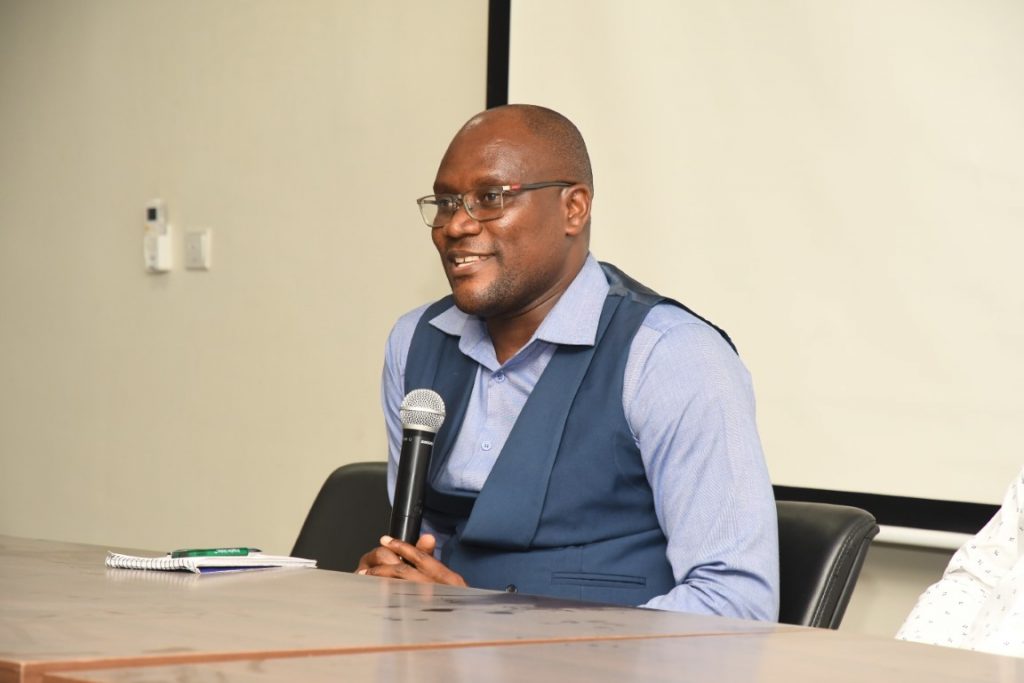
Dr. Osbourne Quaye, Head of the Department of Biochemistry[/caption]
“I would encourage you to keep a very open mind about this [workshop], make the most out of it, don't get tired, and I'm sure it's going to be totally worth it when it's all done,” Dr. Quaye said. A few of you have experienced this as master's students, and they're repeating the dose as PhD students. It's still worth it. So welcome back and all the best for the next two weeks.”
Prof. Sue Vaughan, Professor of Cell and Molecular Biology at the Oxford Brookes University in the United Kingdom, who has been co-designing the workshop in collaboration with Dr. Jack Sunter from the same university and Prof. Keith Gull from Oxford University, also welcomed the participants. She said that it was going to be a rigorous course and encouraged the participants to take advantage of the expert knowledge made available to them, interact with the visiting experts, and ask questions about anything, from course material to career advice.
[caption id="attachment_6023" align="aligncenter" width="1024"]
Prof. Sue Vaughan interacts with participants[/caption]
“It is an intensive course; it is intensive for us as well as for you. I hope you will enjoy it,” Prof. Vaughan said. “So, you're going to be receiving lots of information and lots of instruction, but to get the most out of this course it's really good for you to talk to all of us, so talk to all of the people here about your experiments or your proposal. Ask us about our careers, how did we get to where we are now. It's very important at this point to use the people in the room, and you can talk to them as they're coming around for practical demonstrations, and we will give you time. We've got journal clubs where you'll be in small groups with one of the faculty, and I really encourage you to interact with them. “
Dr. Jack Sunter also encouraged the participants to actively engage with the broad range of knowledge available over the course of the two-week course. He said it was going to be exciting and busy, and reiterated the need for participants to ask questions and learn everything they can.
[caption id="attachment_6026" align="aligncenter" width="1024"]
Dr. Jack Sunter encourage the participants to actively participate in the two-week course[/caption]
`“It's great to be back here. I always enjoy my January trip to get some sunshine here in Ghana,” Dr. Sunter said. “I think the only thing I want to reiterate is that we're here for you. Yes, we do enjoy coming down in January, away from the cold and the wet, but we're here to work for you, so make us work. Ask us questions, really talk to us. That's why we're here and that's why we want to be here.”
During the first week of the workshop, facilitators tackled molecular toolkits for in-depth study of the cell biology of common pathogens. There were lectures on the one health approach to disease research, manipulating gene expression in malaria, and the use of ApE software. There were also practical sessions in a worksheet using EuPathDB, design of PCR approaches, protein homology modelling and in silico cloning and use of ApE. The participants were taken through some professional development courses in CV writing, applications for graduate school/postdoctoral positions, writing travel grants, making presentations on selected topics, as well as giving talks and making posters. They also took part in journal club meetings, where they discussed selected papers and prepared presentations on which they were given constructive criticism.
[caption id="attachment_6000" align="aligncenter" width="1024"]
Dr. Amy Barker in a Journal club meeting with participants[/caption]
The second week of the workshop covered malaria biology, featuring basic lectures from experts in malaria immunology, malaria cell biology, antigen variation and genetic modification of malaria parasites, and practical sessions in basic and confocal microscopy, flow cytometry, Q-PCR assay and invasion assay.

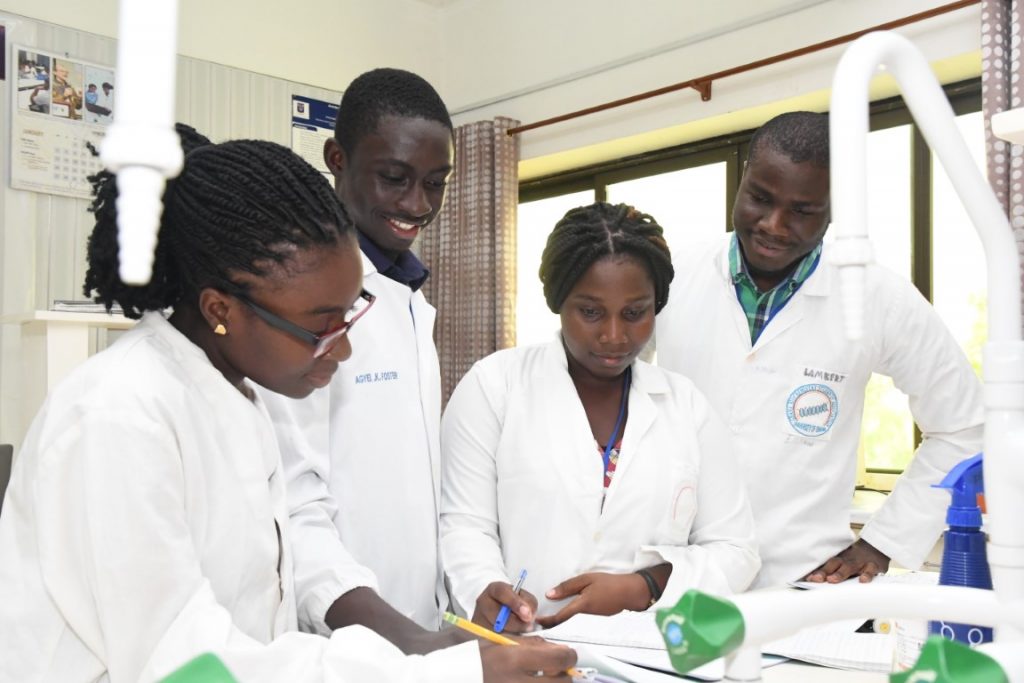
The workshop received researchers from the University of Copenhagen in Denmark, the Oxford Brookes University and Pirbright Institute in the UK, the University of Heidelberg in Germany, the Medical University of Vienna in Austria, the Hebrew University of Jerusalem in The Middle East and the Cornell Medical School in the USA.
Facilitators included Prof. Keith Gull and Prof. Chris Tang of the University of Oxford, Dr. Toby Tuthill of the Pirbright Institute, Dr. Joseph Awuni of the Ghana Veterinary Services Department, Dr .Freddy Frischknecht of the University of Heidelberg, Prof. Lars Hviid of the University of Copenhagen, Prof. Kirk Deitsch of the Cornell Medical School, Dr. Jack Sunter and Prof. Sue Vaughan of the Oxford Brookes University, Dr. Zvika Granot and Dr. Ron Dzikowski of the Hebrew University of Jerusalem, and Dr. Gang Dong of the Medical University of Vienna. Members of WACCBIP faculty who also facilitated some sessions included Prof. Gordon Awandare, Dr. Yaw Bediako, Dr. Lucas Amenga-Etego, Dr. Emmanuel Amlabu, Dr. Yaw Aniweh.
At the end of the two-week workshop, students were presented with certificates. After handing out the certificates, Prof. Awandare thanked the participants for their diligence throughout the two-week period. He also thanked the facilitators for taking time off their schedules to visit WACCBIP and help train the students in various modern techniques in scientific research.
Dr. Osbourne Quaye also commended the participants for their commitment during the workshop. He encouraged them to maintain the same levels of commitment throughout their time at WACCBIP and their careers as scientists after they have completed their programmes of study.

[caption id="attachment_6349" align="aligncenter" width="1024"]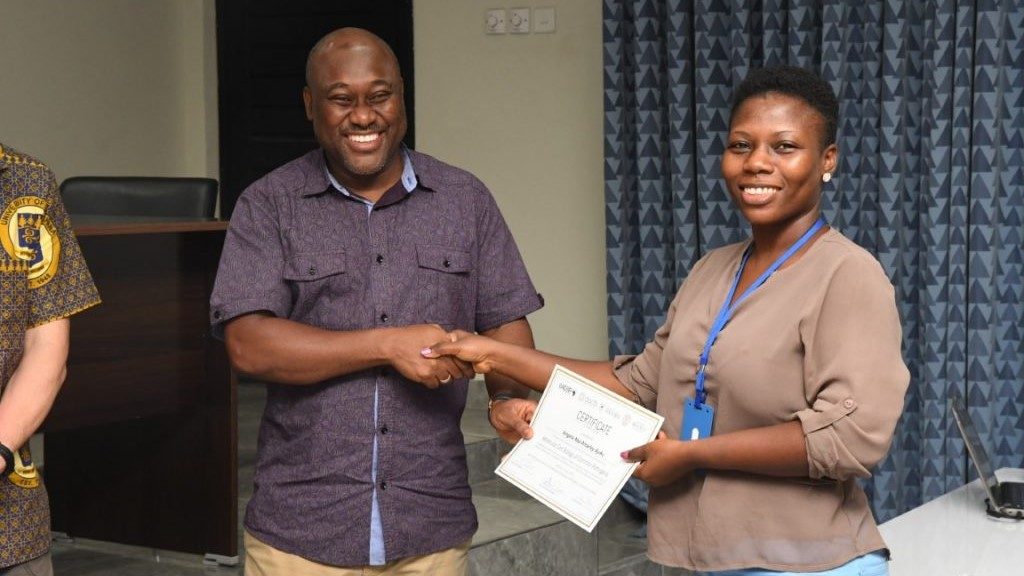
Participants receive certificates after the workshop[/caption]
“I just want to say that what you've had in the past two weeks is to give you the taste and feel of probably the life that you've chosen to live for as long as you live,” Dr. Quaye said. “I think I want to mention that I was telling somebody that what you guys do in two weeks of exams is what most academics do all their lives, every day of their lives. Even if you won't be doing something with your hands or with a computer, you should have it at the back of your mind that this is your life, and run with it because it is not an easy path to walk but the end is worth walking the path.”
[rev_slider alias="ASCB 2020"]


